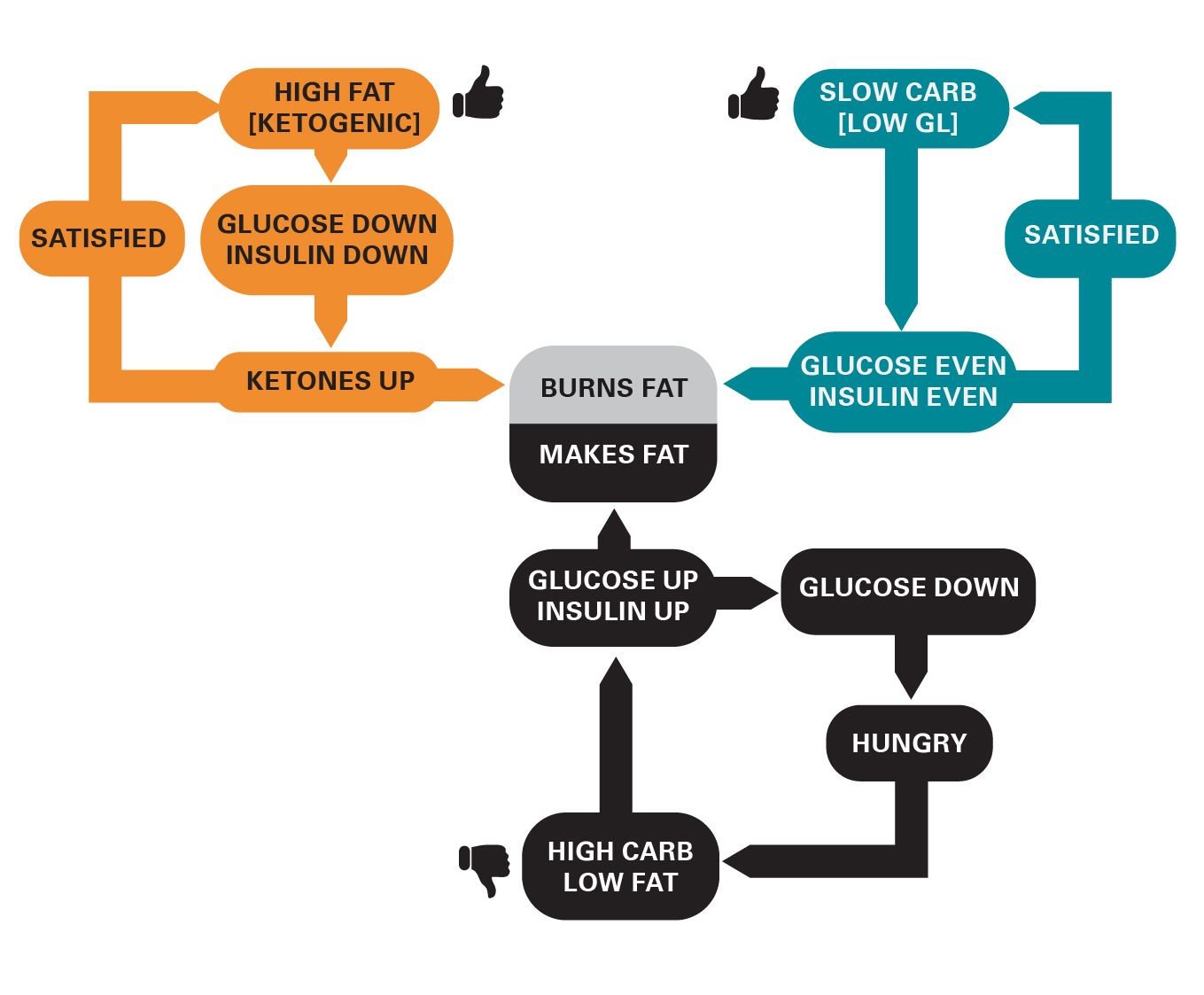This eloquent equation gave birth to the low fatThere are many different types of fats; polyunsaturated, monounsaturated, hydrogenated, saturated and trans fat. The body requires good fats (polyunsaturated and monounsaturated) in order to…, high carb calorieCalories are a measure of the amount of energy in food. Knowing how many calories are in the food we eat allows us to balance… controlled diet (since 1 gram of fat has double the calories of a gram of carbs) which has doggedly remained the cornerstone of public health policy for obesity and dietetics. It clearly hasn’t worked. Every decade more people die prematurely from diet-related diseases, principally driven by high carbs, than all the deaths from both world wars.
Going back 20 years, in both human and animal studies, low GL (glycemic load) or low carb diets with the same calories as low fat diets resulted in more weight loss. Now, a definitive study published last month in the British Medical Journal confirms that the lower the GL of a diet, achieved in this study by lowering the amount of carbohydrates, the more energy you burn off through metabolismMetabolism is a term that is used to describe the chemical reactions that take place within the body’s cells. The body gets the energy it…. In other words you’ll burn off more weight eating a low carb, high fat diet than a conventional low fat, high carb diet despite eating the same number of calories.
The study, co-authored by Professor’s Cara Ebbeling and David Ludwig, Harvard Medical School’s Professor of Nutrition, fed 164 volunteers their ideal calories to maintain their weight, then assigned then to one of three diets – all with the same 20% of calories from proteinProteins are large molecules consisting of chains of amino acids. Proteins are essential nutrients for the human body – they are a building block of… and total calories – but either 60%, 40% or 20% carbohydrateCarbohydrates are the primary source of energy for the body as they can be broken down into glucose (sugar) more readily than either protein or… and conversely 20%, 40% or 60% of calories from fat. This enabled them to measure how many calories of energy their bodies burnt off on the various diets. After five months on the diet trial, those on the low carb, high fat regime burned roughly 250 calories more per day than people who ate a high-carb, low-fat diet, showing that restricting carb intake could help people maintain their weight loss more easily.
What this means is that eating a low carb/low GL diet as opposed to a low fat, high carb diet would be expected to produce a 7lb extra weight loss a year. However, they also found that those on the lower carb, higher fat diets had lower levels of the ‘hunger hormones’ ghrelin and leptin. According to the researchers “If reduction of glycemic load also decreased hunger and food intake, the long term benefits could be even greater.” This is certainly my experience having worked with thousands of low GL dieters who report that they just don’t feel hungry, even on lower calories, as long as they three low GL meals, and two low GL snacks designed to keep their blood sugar even and consequently their insulinInsulin is a hormone made by the pancreas. It is responsible for making the body’s cells absorb glucose (sugar) from the blood…. production low.
According to Dr. Dariush Mozaffarian, the dean of the Friedman School of Nutrition Science and Policy at Tufts University, who was not involved in the research “This study confirms that, remarkably, diets higher in starch and sugar change the body’s burn rate after weight loss, lowering metabolism. The observed metabolic difference was large, more than enough to explain the yo-yo effect so often experienced by people trying to lose weight.” Dr. Mozaffarian called the findings “profound” and said they contradicted the conventional wisdom on calorie counting. “It’s time to shift guidelines, government policy and industry priorities away from calories and low-fat and toward better diet quality.” The authors of the study agree “A low glycemic load, high fat diet might facilitate weight loss maintenance beyond the conventional focus on restricting energy intake and encouraging physical activity.”
It confirms Ludwig’s ‘Carbohydrate–Insulin Model of Obesity’, which proposes that insulin, which is released when you eat carbs, is the primary driver of weight gain, hence any approach that keeps insulin down is going to reduce hunger and weight gain. The calorie theory assumes our metabolism is a simple engine, which it is not. Carbohydrate–Insulin Model of Obesity factors in our complex metabolism, and how it deals differently with carbs than fat.
Although even those on the lowest carb intake in this study were not low enough to be on a ketogenic diet, Ludwig calls for more research to see if such very low carb diets have any additional advantage. The time is well overdue to put the emphasis on the GL (glycemic load), not the calories, of our diet, and end fat phobia.

In my Hybrid Diet, out in March, I’ll explain why both a low GL/slow carb diet and a high fat/low carb diet work better than a low calorie low fat diet, but the real good is switching between the two. Find out more at www.hybriddiet.co.uk


Comments
Join the Conversation on our Facebook Page